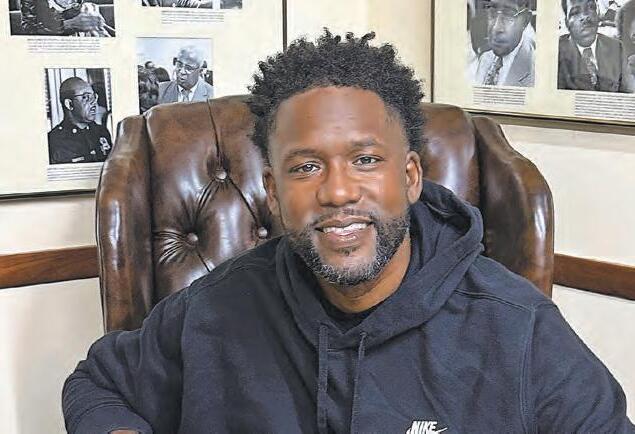
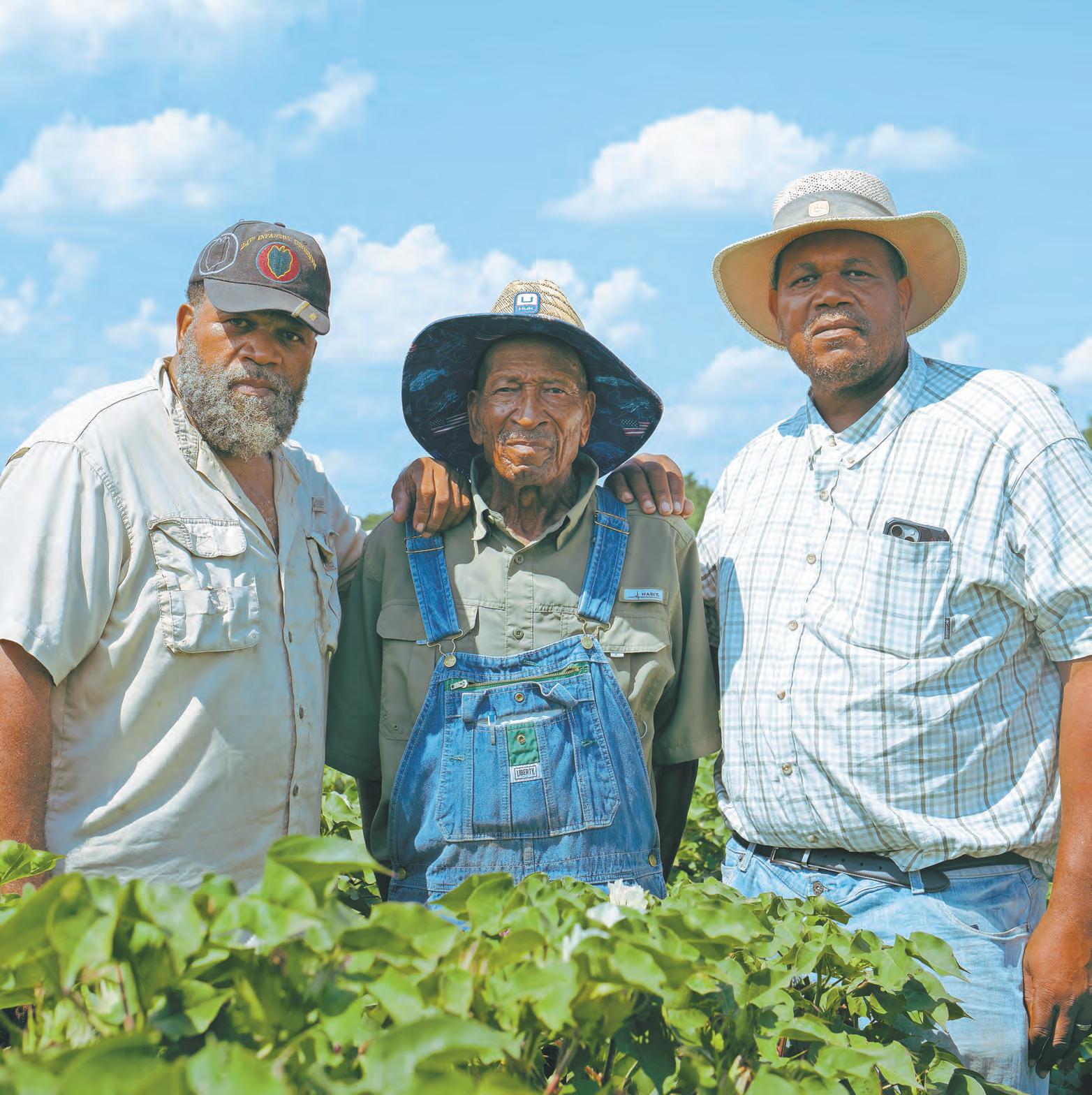



By TABIUS McCOy Report for America Corp
At 55 years old, Willie Scott has been farming ever since he could walk.
“The first thing I learned to drive was a tractor at seven,” said the Collins, Georgia native.
His 800-acre, third-generation family farm in Tatnall County was passed down from his grandfather to his father and eventually to Scott. The farm has been in the family since his grandfather purchased it in the 1940s. In the more than 30 years that he has run his commercial farm, Scott has seen some high moments, like the surge in cotton prices around 2021, a past partnership with Target, and simply doing something he loves for a living, he said. However, being in this business also has its low moments. Just this past month, he has been hit with a challenge that neither he nor researchers fully understand.
It’s tiny—smaller than a gnat at about onetenth of an inch. It flies from leaf to leaf, pale green with a brown spot on each of its itty-bitty wings. The green leaf hopper, Amrasca bigtulla, better known as cotton jassid, is rapidly spreading across Georgia’s cotton belt, according to the Georgia Department of Agriculture (USDA), impacting more than 40 counties and farms across the state, including Scott’s.
Georgia’s Cotton at Risk
With cotton prices already low and demand dropping for U.S.-grown cotton, this
little pest is just another setback for farmers. Georgia is one of the top cotton-producing states in the country, according to the USDA. Cotton stretches over more than a million acres here. That means when something like the jassid shows up, it puts Georgia’s cotton industry at risk, but could also impact others across the nation.
For the past six years, cotton has been Scott’s main revenue driver. Currently occupying over 400 acres of his land, he says the jassid has already touched most of it, leaving him searching for a way to stop the attack.
How did they get here?
The cotton jassid is native to the Indian subcontinent, according to Dr. Phillip Roberts, a cotton Extension entomologist and professor at the University of Georgia who has been researching the pest even before it reached Georgia. The insect first appeared in Puerto Rico in 2023, then in Florida in 2024, and was spotted in Georgia’s Seminole County on July 9, 2025.
How it traveled to Georgia remains uncertain. “Who knows,” said Dr. Roberts. “Potentially, they could have moved up with the storm. We had a lot of hurricanes last year and could have pulled insects like them here to Georgia.”
How does it spread?
The pest feeds on the underside of cotton leaves, releasing a yellow toxin that weakens the plant’s ability to photosynthesize,


according to a recent University of Georgia report. Though largely found on cotton, it also feeds on okra, eggplant, and sunflowers.
“We can find this insect on nearly all of the cotton in the Coastal Plain, which is about 98% of Georgia’s crop,” said Dr. Roberts. Since July, it has been traced in more than 40 counties.
Scott first heard about the jassid at a Georgia Cotton Committee meeting last month, where he serves on the board. Soon after, he spotted it in neighboring counties. “That’s when I got nervous,” he said. Within weeks, it was on his land.
Walking through his fields, Scott points out the tiny, gnat-sized insects, their color blending into the leaves. “If you look really closely, you can see one right there,” he said, turning over a cotton leaf as a few of the pests crawled on the back. Their short lifespan means they can reproduce quickly, with females laying 18 to 30 eggs at a time and regenerating every two weeks, sometimes less.
Even though the insects may be hard to see, the damage is not. “I lost all that cotton with the red at the top,” Scott said. Dr. Roberts’ research has shown that when the pest sucks the juice from the cotton plant, the leaves begin to shrivel, eventually turning red, and at that stage, there’s not much that can be done.
Can it be stopped?
Researchers at UGA Cooperative Extension
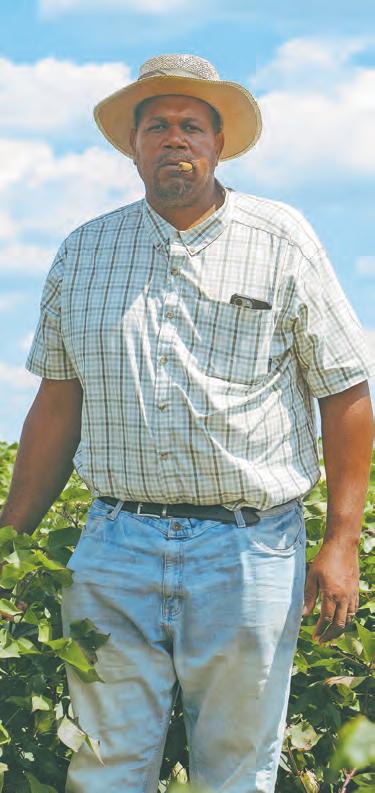
By DONNELL SUGGS
Former Georgia Lieutenant Governor Geoff Duncan and current Georgia Secretary of State Brad Raffensperger have joined the long list of Democrats and Republicans running for the state’s top spot.
Duncan will run for governor as a Democrat after years of being a highly vocal and supportive Republican. On Wednesday morning, he dropped by The Black Coffee Company, a small business on Jonesboro Road on the city’s southwest side, to discuss the importance of supporting small businesses. Upon his arrival, Duncan, wearing a blue striped polo, matching khakis, and sneakers, was greeted by one of the shop’s co-owners and proceeded to walk in and talk shop with him and other small business owners.
After learning the backstory of how The Black Coffee Company got started, Duncan said the business, which now has multiple locations, including in the Atlanta University Center, had an amazing story.
“To go from a dream to a business, that’s an amazing story,” Duncan said. “I think the customers that are in here feed off of this story.”
The Black Coffee Company is a popular spot for small business owners and workfrom-home folks, and on Wednesday, the shop was packed with people tapping on laptops and sipping coffee and tea.
It could not have been a better time or place for a candidate looking to switch political allegiances to show his face. To do it at a Black-owned business feels more strategic than anything else. Duncan ordered a small plain black coffee and complimented the mural on the wall near the entrance. Among the famous faces in the mural are Georgia Senator Jon Ossoff and one of Duncan’s Democratic primary candidates, former Atlanta Mayor Keisha Lance Bottoms.
In a statement to the media announcing his candidacy, Duncan said in part:
“As Georgia’s first Democratic governor in 28 years, I will stand up to Trump and his yes men in our state while bringing down the costs of childcare, health care, and housing so every Georgia family is in the best position possible. That’s what Georgia deserves,” Duncan said in a statement announcing his campaign that was sent to The Atlanta Voice.
A falling out with the MAGA set led Duncan, 50, to change his political tune. On the Democratic ticket, he will join Georgia State Senator Jason Esteves, Georgia State Representative Derrick Jackson, former DeKalb County CEO and Georgia Labor Secretary Michael Thurmond, and Olu Brown. The latter, a preacher and educator, has no previous political experience.
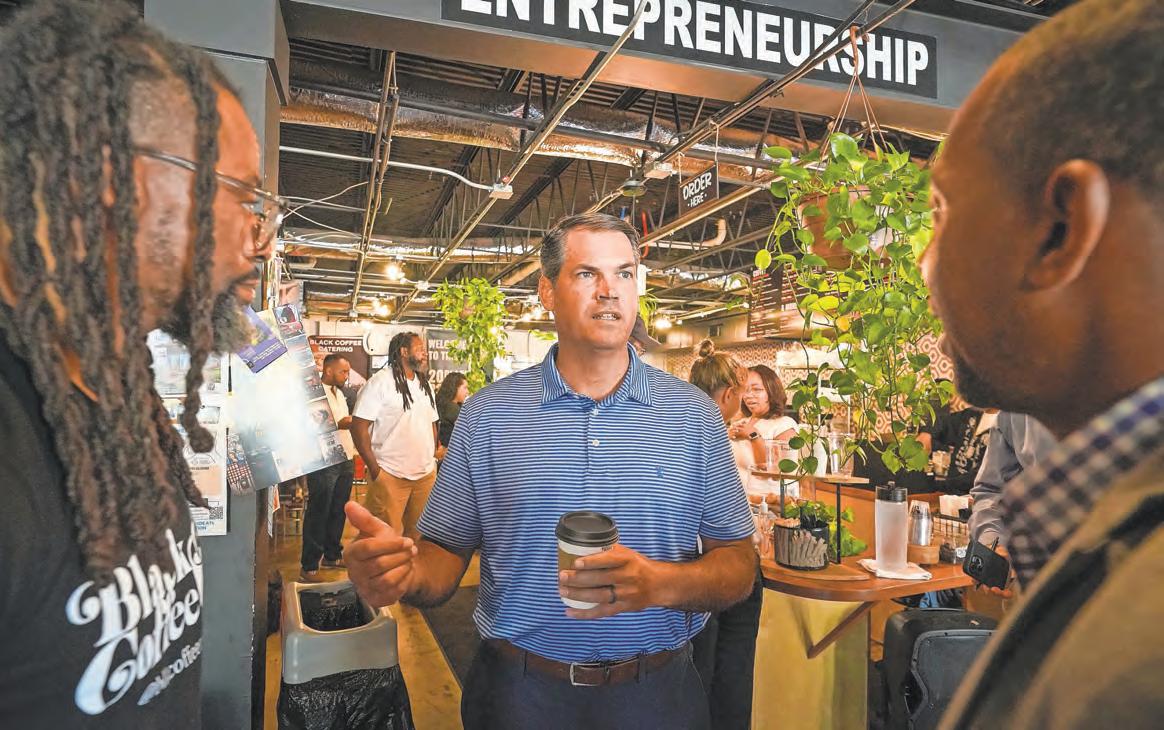
The four men of color on the list each participated in a gubernatorial forum in Warner Robins last month. Republican candidate Ken Yasger, a former United States Marine who has been vocal about his struggles with alcohol abuse, was also in attendance. Like Brown, Yasger is a political neophyte. Former Atlanta Mayor Keisha Lance Bottoms is also campaigning to lead the Democratic ticket next year. Bottoms was not in Warner Robins on August 20, but neither were the Republican gubernatorial candidates, Georgia Attorney General Chris Carr, and Georgia Lt. Governor Burt Jones. Current Georgia Governor Brian Kemp has publicly endorsed registered Republican Derek Dooley.
Duncan is not new to campaigning in front of Democratic voters. During former United States President Kamala Harris’s historic presidential campaign, Duncan made multiple public endorsements and appearances for her campaign.
“Georgians deserve leaders with the courage to take on Donald Trump and do what’s right,” said Duncan in that statement.
Raffensperger might not make too many public appearances at Black-owned small businesses, after all, he is not switching parties, and remains a staunch Republican. The Secretary of State was, however, a small business owner and spoke about the importance

of making small business dreams a reality during a visit to Clayton County and the Riverdale Towne Center last month. Clayton County has a majority Democratic voting block, and Raffensperger might have been tipping his hand when he visited there to discuss small business ownership with the Clayton County Chamber of Commerce.
In a statement to the media announcing his candidacy, Raffensperger said in part:
“Hardworking Georgians are struggling to put food on the table. Parents worry about their kids being indoctrinated in the classroom. Too many families live in fear of gangs, cartels, and violent criminals,” said Raffensperger.
“Our future is in peril, yet cowardly politicians cave to well-funded special interests and political elites—sacrificing the well-being of our families to advance their own agenda.”
By DEDRICK ASANTEMUHAMMAD
The “One Big Beautiful Bill” Act represents an over 40-year march toward concentrating wealth among the wealthy and deepening the racial disparity under the guise of economic growth. In practice, it is a project of wealth consolidation, recycling the same logic that stripped Black communities of opportunity, blamed them for its consequences, and codified that inequality into law.
In today’s economy, wealth is not the reward for hard work or success, but the prerequisite for participating in it at all. From homeownership to higher education to entrepreneurship, the key components of wealth-building demand capital to access opportunity. Families without capital are kept in asset poverty, mired in debt, risk, and economic instability.
According to the U.S. Census Bureau, in 2021, the median wealth of white households was $250,400, while Black households were only $24,520, approximately one-tenth of their white counterparts. Ignoring that Black Americans were systematically denied the chance to build wealth even as their labor fueled the nation’s prosperity, lawmakers continue to blame individuals for outcomes shaped by generations of exclusion. This fuels a narrative that punishes people for lacking assets they were never allowed to accumulate, deliberately erasing the impact of entrenched structural racism.
This narrative — and the policies that sustain it — were entrenched in the 1980s through tax cuts for the wealthy, widespread deregulation, and the collapse of manufacturing. Black workers, who had only recently gained access to union jobs and industrial stability through decades of civil rights struggle, were especially vulnerable to this shift. Reagan-era legislation, such as the Economic Recovery Tax Act, deep cuts to social programs, and rolling back protections for moderate to low-income workers, naturalized inequality and stripped the government of responsibility for correcting it. Under this model, the economic disparity was framed as the outcome of personal failure and market logic, ignoring the policy choices

it further. Photo Credit: iStock.com/Deagreez
that ended the rise of the American middle-class and prevented most African Americans from ever having middle-class wealth. Today, we are seeing a renewed embrace of the same logic that deepened the racial wealth divide in the past.
At the heart of the bill is a permanent extension of the 2017 Tax Cuts and Jobs Act (TCJA), which was scheduled to expire at the end of the year. According to the Bipartisan Policy Center and CBO projections, these changes will reduce federal revenue by $4.5 trillion, increase federal spending by $325 billion, and add $3.4 trillion to $4.1 trillion in deficits when accounting for interest costs over the next decades.
The Joint Center’s 2025 tax policy brief reveals that although the typical Black household might see a temporary tax reduction, the vast majority of benefits accrue to the top 20% of earners — disproportionately white. Because Black households are less likely to hold high-income jobs or significant financial assets, they are structurally excluded from the bill’s
long-term gains.
For example, taxpayers earning $50,000-$60,000 — a common level for Black households — would see a modest rate reduction from 9.1% to 7.5% by 2027. But by 2033, their tax rate is expected to rise to 10.3%. Meanwhile, households earning more than $200,000 would enjoy a $338 billion collective tax reduction by the same year, compared to only $12.9 billion for the middle-income group, according to the Joint Center.
The “One Big Beautiful Bill” also touts populist-sounding incentives, such as “no tax on tips” and overtime. But analysis by the Center for American Progress reveals that the tips deduction offers minimal relief to low-income workers. These incentives represent only a small fraction of the bill’s cost and do nothing to offset sweeping cuts to programs that actually support economic mobility.
PBS also reports that the bill is estimated to lead to a mass loss of access to Medicaid and slash the Supplemental Nutrition Assistance
Program (SNAP), affecting millions. Consequently, the burden will fall on low-income families who rely on these supports for survival.
We must hold lawmakers responsible for years of policies that continue to shut the doors to the dream of American middle-class security and leave behind the racial inequality of the past.
The country’s “One Big Beautiful Bill” is a project of consolidating wealth for the wealthy, cutting opportunity for the rest of America, and pushing the nation deeper into debt. Reversing course will require not only a sustained, populist approach, but a rejection of the false narrative that individuals are to blame for the consequences of exclusion. The sooner we name that lie, the sooner we can build something better.
Dedrick Asante-Muhammad is the president of the Joint Center for Political and Economic Studies Jaidyn McKinnie is a student at UCLA and research intern Joint Center for Political and Economic Studies
FOUNDED
May 11, 1966
FOUNDER/EDITOR
Ed Clayton
Immortalis Memoria
PUBLISHER/EDITOR
J. Lowell Ware
Immortalis Memoria
The Atlanta Voice honors the life of J. Lowell Ware.
PUBLISHER
Janis Ware
PRESIDENT/
GENERAL MANAGER
James A. Washington 2018-2024
EXECUTIVE ASSISTANT TO PUBLISHER
Chia Suggs csuggs@theatlantavoice.com
EDITOR IN CHIEF
Donnell Suggs editor@theatlantavoice.com
GENERAL ASSIGNMENT REPORTERS
Isaiah Singleton isingleton@theatlantavoice.com
Laura Nwogu lnwogu@theatlantavoice.com
BUSINESS REPORTER
Tabius McCoy tmccoy@theatlantavoice.com
EDITOR AT LARGE Stan Washington swashington@theatlantavoice.com
ADVERTISING ADMINISTRATOR
Chia Suggs advertising@theatlantavoice.com
SALES
RDW Jackson rdwadman@gmail.com
SUBMISSIONS
editor@theatlantavoice.com
DIRECTOR OF PUBLIC RELATIONS
Martel Sharpe msharpe@theatlantavoice.com
CONTACT INFORMATION
633 Pryor Street, S.W. Atlanta, GA 30312
Office: 404-524-6426 info@theatlantavoice.com


Continued from page 2
and the Georgia Cotton Commission are testing insecticides, including Bidrin, Argyle, Assailas, Carbine, Centric, Transform, Sefina, Sivanto, and Bifenthrin. So far, Bidrin has been the most consistent among commercial farmers.
Scott is currently spraying Bidrin. He says it appears to be working, but he’s waiting to see how effective it really is.
At such an inconvenient time
The jassid arrived at a financially crushing time for many cotton farmers. “The cotton market right now is really bad,” said Dr. Camp Hand, a Georgia cotton agronomist and professor at UGA. “If you were to book some [cotton] right now for December, it would sell for about 67 cents a pound, which is way below the price it takes to produce the crop.” Prices have been consistently that low since the Covid-19 pandemic in 2020.
An acre of cotton yields about 880 pounds, or roughly $589 in sales. For Scott, production costs run about $700 per acre, leaving him at a loss similar to many other cotton farmers. The pesticides alone add another $20 per acre. If the insecticide doesn’t
work, Scott estimates he could lose around $8,000. “The only thing we can do is just hope and pray that what we’re doing works,” he said.
Although consumers may not bear the added costs, farmers like Scott are the ones paying for it. The price of cotton is set on the global market, leaving farmers with little control over how much their crop is worth. As cotton prices have decreased over the past few years, demand for U.S. cotton has declined, as more people turn to synthetic fabrics like polyester, both Scott and Dr. Hand explained.
To make matters worse, the jassid arrived just before harvest season, which is typically October through November. Scott said harvesting the cotton early is not a good option, as cotton bolls have not yet matured.
What’s next?
When asked about the potential long-term impact of this pest and solutions, Dr. Hand said, “That’s the million-dollar question. Right now, we’re just trying to survive 2025.”
Despite the unexpected challenge, Scott refuses to be discouraged. “It’s kind of like football—you’re trying to score that touchdown, and different things are out there trying to stop you. But you’ve got to have in your mind to say, ‘I’m getting to the end zone.’”









By ISAIAH SINGLETON
It’s a sunny day in Glenwood Park, people are walking their dogs, chatting amongst themselves, and as you walk across from 424 Bill Kennedy Way, next to PINK Sky Boutique, you smell the sweet scent of fresh-baked goods and ice cream.
This sweet aroma comes from Westside Creamery’s Sweet Spot, owned by Debra and Llew Eastern, a husband-and-wife duo. Debra fell in love with baking at the age of eight in her hometown of Milwaukee.
On Saturday mornings, an elderly wheelchair-bound landlady who lived downstairs from Debra would direct her on how to bake homemade peanut butter cookies from the wheelchair. A year or so later, the woman became ill and gifted Debra the cookie recipe book from which she would bake her cookies.
“She insisted that I cherish the book because it had been handed down to her from her grandmother,” Debra said.
This moment was the catalyst for what would eventually become Westside Creamery Desserts, a unique business that combines ice cream, cookies, cakes, and gourmet popcorn, all served from a mobile food truck.
All these years later, Debra and Llew have served frozen desserts and baked goods across Atlanta’s metroplex and surrounding counties for over 11 years.
Debra’s journey to starting Westside Creamery was not without its challenges, however, and after years of dreaming about owning a bakery, the opportunity to purchase a mobile ice cream truck presented itself.
The original owner encouraged Debra to think bigger, asking her, “Why not offer all America’s favorite snacks: ice cream, cakes, cookies, and popcorn?” This is where Westside Creamery Desserts was born in 2014 as Atlanta’s first mobile dessert business.
In its beginning, Debra and Llew juggled the business with full-time jobs and other commitments. After nearly five years of

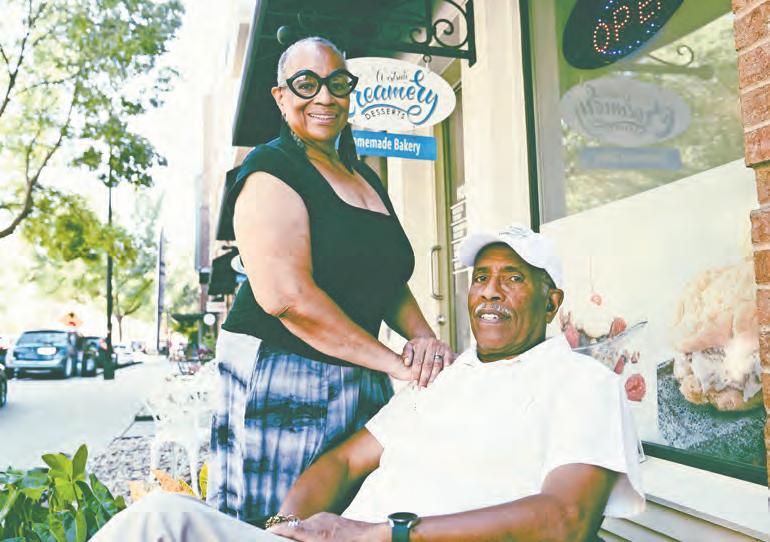
business, Debra and Llew began considering expanding into a brick-and-mortar location.
This is when they decided to seek aid from the Georgia MBDA Business Center.
Westside Creamery’s Sweet Spot
Located at 880 Glenwood Ave SE in Glenwood Park, Westside Creamery’s Sweet Spot specializes in homemade bakery, artisan hand-dipped ice cream to include vegan ice cream and non-dairy sorbet, floats, sundaes, Llew’s Brews (ice coffee prepared with freshly grounded coffee beans and their inhouse (non-alcoholic) liqueur, blended with a scoop of ‘eyes-wide-open’ coffee ice cream).
They also offer a line of vegan bakery to complement their frozen vegan desserts and specialty whole cakes and pies are available with 72-hour advance order.
Westside Creamery began as Atlanta’s first dessert food truck in 2014, running seasonally until 2023. The Easterns, a retired college professor and a former middle school principal, opened a brick-and-mortar store named “The Sweet Spot”.
Known for its’ homemade pound cake and ice cream, the business employs former employees who started at 14, many now pursuing higher education. Debra said she also noticed a significant growth post-COVID, with demand tripling after a viral TikTok video.
Llew says the most important thing about this business is it’s what God gave them, and it is always “faith over fear,” a motto they’ve had on their food truck and now on their door inside the shop.
“All this came into fruition, and one thing happened after another. It was just us to

begin with, and this entire thing has been a Godsend because he says in Jeremiah 29:11, I know what plans I have for you, plans to prosper you, and not to harm you,” he said.
The Easterns are committed to preserving and passing down baking skills, ensuring the legacy continues.
She also still has what’s left of the torn worn and tattered cookie book and cherishes it, alongside her first edition 1963Kenner’s Easy Bake oven and a few of her late mom’s antique baking gadgets which are all displayed at the Sweet Spot.
Also, Westside Creamery runs with a family-centric approach, emphasizing freshness and quality. They rejuvenate their offerings on Wednesdays, preparing new dough, cookies, and cakes.
The entire family and high school students collaborate on tasks like restocking, baking, and supporting the premises.
Debra says her 36-year-old son, Armon,
came to her one day saying he wanted her to teach him how to bake, which threw her off kilter because she wondered why he didn’t ask when he was younger.
“I’m thinking to myself, ‘can I teach this old dog new tricks?’ which I was skeptical about, but I couldn’t deny him that opportunity,” she said. “I began showing him how to bake and tutored him.”
This turned into a huge bonding moment for the two where Armon could help with prepping, which helped Debra focus more on other things in the shop.
“I tutored him to bake a cake and allowed him to prep my flour and everything because most of the prep is very time-consuming, so when he turned that cake out of the pan, he was so proud, and I was so proud of him, so giving him the opportunity to hone those skills became a legacy,” she said.
Armon said he asked his mom to teach him how to bake because he always thought his mom had skill sets that would go perfect for a daughter, but she didn’t have one.
“She has so many skills sets that would go great with a daughter, but she doesn’t have one, and I didn’t want those skills to go to waste and not be passed down, even if or when I have children,” he said. “I want to be able to pass that legacy, and I want people to remember her for the things she’s good at.”
As Armon looks around the shop, he says he is proud of his parents as they have set out their visions and dreams and have executed them.
“My mom is a doer, and Llew is great support; he’s the backbone. My mom is the gas and Llew is the brake, she makes things happen, and he’s the control, they complement each other well, and that makes a successful team,” he said.
Debra says it is a full-circle moment from being eight years old and beginning to bake to now owning her own bakery, which she has always wanted to do.
“Some days I feel accomplished when I walk in the door having an awe moment, and other days, it can get overwhelming sometimes because after we went viral on TikTok with the cheesecakes and our perfect pair combination, demand skyrocketed,” she said.
She says she went from being able to get away with four-pound cakes a week to where now she’s up to 12 a week. Debra says she is currently looking for more bakers.
As for advice for aspiring entrepreneurs, Debra says you may have a degree in one thing, but it does not mean that’s not the end of your story.
“Never let go of your dream, whatever your passion is. Baking isn’t my job, it’s my passion. If you’re working within your passion, then you are more likely to succeed,” she said.
By SHERNAy WILLIAMS
Word in Black
Asimple question sparked complicated answers: “Would you participate in a clinical trial?”
“I would be nervous,” Baltimore resident Kim Pennington admits. “It has to be a sacrifice, and I don’t know if I want to sacrifice my health and my life for a trial.”
She’s not alone. Black women make up just 2% of all cancer clinical trial participants. Experts say this lack of participation is one of the reasons Black women are 38% more likely to die from breast cancer.
Clinical trials aren’t experiments on strangers. They’re where new medications or treatments are tested on people who volunteer to participate, allowing researchers to determine if they’re safe and effective. It’s a form of medical research — and they’re often the only way patients can get access to the most advanced treatments.
“Clinical trials are just a marvelous opportunity to get the most cutting-edge therapy that’s available,” explains Georges C. Benjamin, M.D., executive director of the American Public Health Association.
So why are Black women underrepresented? The answer lies in a long history of exploitation and exclusion.
A 2023 survey of 257 Black women across the U.S. conducted by TOUCH, The Black Breast Cancer Alliance, found that historical mistreatment of Black bodies in the name of medical research contributes to hesitancy like Pennington’s.
“There is a long history of mistrust in the Black community of the medical establishment; much of it is well-founded,” says Oliver Brooks, M.D., past president of the National Medical Association.
Generations of Black folks know about Black men and women who were treated unjustly by the U.S. medical community:
• In the 1840s, the so-called father of gynecology, J. Marion Sims, perfected surgical techniques still employed today by operating on enslaved women without anesthesia. His statue stood in Central Park until 2018.
• Throughout the 20th century, Black men and women were sterilized without consent.
• From 1932 to 1972, the U.S. Public Health Service let hundreds of Black men in Alabama go untreated for syphilis under
false pretenses. They were told they were being treated for “bad blood,” but researchers were purposely withholding treatment so they could study the progression of the disease. That study ended in 1972.
• In the 1950s, Henrietta Lacks went to Johns Hopkins complaining of vaginal bleeding.
The institution took her cells without consent, and the medical community continues to use them for research today. Her descendants only reached a settlement over her cells in 2023.
Today, federal consent and ethics laws protect people participating in research studies. But mistrust isn’t the only reason Black women stay out of clinical trials. Ricki Fairley, co-founder of TOUCH, The Black Breast Cancer Alliance —– the organization that conducted the survey on Black women and hesitancy —- says some Black women may fear being “guinea pigs.” But the biggest reason they don’t participate in clinical trials is recruitment — or the lack thereof.
“Whether it’s illicit bias, racism, or whatever you want to call it, we’re not invited,” she says.
“I know I wasn’t asked,” adds Latoya Bolds-Johnson, a breast cancer survivor. “I had to push for it.”
Diagnosed at 36, the mother of three says her doctor shrugged off her request to join a clinical trial. “He was very dismissive about it,” Bolds-Johnson says. She had to find another physician willing to enroll her in a study.
“Clinical trials do save lives,” she says.
Fairley knows this first-hand. A breast cancer survivor herself, she credits a clinical trial with saving her life. That’s why she launched the campaign called When We Tri(al).
The initiative features an online platform that enables Black women to complete questionnaires, which are then matched with clinical trials relevant to them and their health needs. Fairley says the effort has helped enroll more than 25,000 Black women into clinical trials.
Fairley says that when more Black women participate in clinical research, it helps scientists better understand how conditions like breast cancer impact them.
“There’s a growing body of science that is validating that a Black breast cancer cell looks totally different from a white breast cancer cell,” Fairley explains. “And guess what the drug [cancer treatments] were made on? The
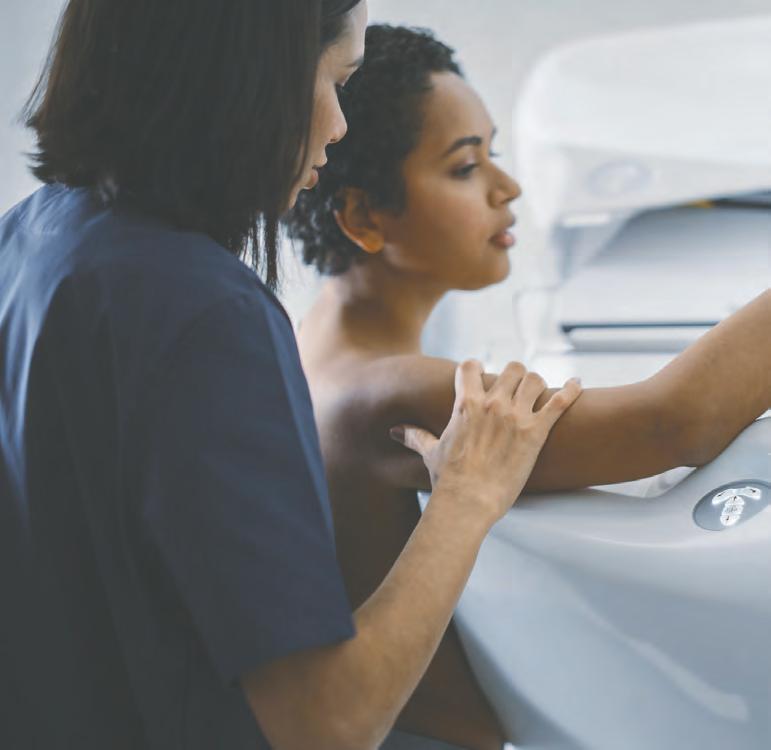
drugs were made on white cells.”
A research team at the Johns Hopkins University School of Medicine announced similar findings. Dipali Sharma, Ph.D., and her team discovered that breast cancer cells from Black women multiply at faster rates and are more likely to spread to other organs than cells from white women.
Over the last several years, she and her team have been comparing breast tissue donated with consent by Black and white women who were diagnosed with triple-negative breast cancer (TNBC), one of the most aggressive types. Black women are disproportionately affected by this variant of the disease.
“Why [are] younger African American women getting TBNC, and why when they get TBNC, is it so aggressive?” Sharma asks. “That was our goal, to understand that.”
The Johns Hopkins team is now testing a treatment option shown to slow these aggressive cancer cells among Black women. However, before it becomes available to patients, the next step is for researchers to conduct a clinical trial.
Part one of this series explored how Black breast cancer research like Sharma’s is under threat because of the Trump administration’s stance on DEI.
For Georges Benjamin, the head of the American Public Health Association, the stakes couldn’t be higher.
“We will push back,” he says. “In the end, we will win. But if you don’t do these things with intention, they won’t happen.”
That intention, he says, starts with trust. Researchers must also reconsider their approach
to working with members of the Black community if they want to advance medical research.
“To go into research for a clinical trial, you have to have a lot of trust that the doctors aren’t, quote-unquote, experimenting on you,” he says. “Well, guess what? They actually are.” That is why, he argues, effective medical research requires cultural sensitivity and relationship building, including with trusted Black physicians and pharmacists who can relay clinical trial information to their patients.
Columbia University professor Adana Llanos Wilson, Ph.D, an epidemiologist who’s conducted dozens of studies around Black women and breast cancer, agrees. She says the issue isn’t getting more Black women to participate in research; it’s the medical community’s failure to earn their trust in the first place.
“When we build authentic relationships with communities, when our research teams reflect the populations we aim to serve, and when we show up with respect and transparency – Black women show up too,” Wilson wrote in an email to Word In Black.
For Bolds-Johnson, participating in a clinical trial was a no-brainer.
“I needed my body to be studied,” she explains. “I have three daughters who will develop breasts soon, and whatever I could do to contribute [to] Black research, I needed to do it. I had to do this for my children — my girls.”
This is part two of a multimedia series exploring Black women and breast cancer. It was published with the assistance of the Journalism & Women Symposium (JAWS) Health Journalism Fellowship, supported by the Commonwealth Fund.
By DENNIS MALCOLM ByRON AKA ALE SHARPTON
I have been impressed with what Genesis has produced over the past few years, and the 2026 Genesis GV70 3.5T Sport Prestige provided the perfect opportunity to see what the brand’s future brings. Ultimately, I will say it is very bright. The GV70 is an upgraded package of performance, luxury, and advanced technology which promises to be a true standout in the competitive compact luxury SUV sector.
The review car’s exterior introduced Genesis’ signature Ceres Blue exterior, a color inspired by the planet Ceres with a steadily changing tone of blue, gray, and some violet tones depending on how the light hits it; if I was a prospective buyer, I’d strongly consider it. Complemented with 21-inch alloy wheels, a bolder grille, panoramic sunroof, and custom two rows of LED lights, this GV70’s styling delivers a visual presence that’s modern, sophisticated, and with the Ceres paint, electric.
Under the hood, the GV70’s 3.5-liter turbocharged V6 heart is paired with a smooth-shifting eight-speed automatic transmission, resulting in a punchy 375 horsepower and 391 pound-feet of torque.

The standard AWD system and multiple drive modes—I used Sport+ whenever I had the chance—ensured optimal traction in various road conditions and made virtually any driving challenge worry free.
Inside, the Sport Prestige trim is pampering. Carbon fiber trim accents, suede headliner, and adjustable interior ambient lighting create a tranquil, driver-focused environment with all the right luxurious appointments. Heated and ventilated front seats and heated second-row seats layered
in eccentric Ultramarine-hued leather made the interior pop, while the tri-zone climate control allowed each passenger to personalize their riding experience.
On the tech side, the GV70’s technology suite is equally impressive. The 27-inch OLED panoramic instrument cluster with multiple panels, swipe screens, and surround view monitor creates an awesome cockpit experience. Keeping things incident free, the rear cross-traffic collision avoidance-assist, smart cruise control,
By DONNELL SUGGS
Terence Lester, founder and executive director of Love Beyond Walls, dropped by The Atlanta Voice to discuss the unhoused and affordable housing and what could be done about both in Atlanta.
Lester has many conversations about how a city growing as fast as Atlanta can ever truly keep up with the number of people living on its streets, in its shelters, and in its motels. His answers can be both complex and quite simple.
“Accessible housing is how we solve it,” Lester said. “You know many Americans, United States citizens, are one paycheck away?”
According to data from RentCafe.com, Atlanta is one of the most expensive cities in the country. The average rent for an apartment in Atlanta is $1,773 per month.
Lester believes the city and state political leaders can help create an environment where there can be luxury apartments and accessible housing (he doesn’t like to use the more popular phrase, “affordable housing”) in the city.
“People who hold or occupy spaces of political power can address some of these issues,” Lester said. “Do we create a task force to think of how we can create more housing? Do we put caps on the rising rents?”
Reframing the narrative of homelessness in order to humanize the people who are enveloped in the issue.
“We have to keep the narrative in the forefront of people’s
minds,” Lester said. “People strategically make suffering invisible, whether by public policy or public sanitation, or displacement. If people aren’t seen, then people aren’t part of the conversation.”
Having experienced brief periods of homelessness as a young person, Lester said he wants to change what it means to be poor and unhoused in the country, not just in Atlanta. He says this is the type of work he, his wife Cecilia, his daughter Zion, 17, and Terence II, 14, are also involved in.
“I’m really passionate about this. I wish we cared more about building people than building buildings,” Lester said.
Lester explained that it would be as simple as jumping in a car and riding in any direction in Atlanta to find homelessness.
“Correta Scott King said poverty is violence,” Lester said. “Poverty is not just about economics; it’s social, it’s spiritual, physical, psychological, and environmental. When you see a person standing on the street corner who you know is from this city, you can see the erosion of their soul. Poverty has impacted their whole well-being.”
Lester wants more discussions involving “the actual people who love the city and the people from here.” He wants more local forums on homelessness and “accessible” housing to include the people it directly affects.
“We need to reframe the language of what’s affordable. Affordability doesn’t solve the issue of homelessness because you’re talking about people being able to afford something they can’t afford,” Lester said.
head-up display and intelligent speed limit notification are certainly appreciated. Regarding convenience, the Genesis Digital Key 2 allowed entry without a traditional key fob, power hands-free smart liftgate, a repositioned wireless charger, and manual rear side sunshades elevated GV70’s practicality and convenience. With entertainment, the Apple CarPlay/Android Auto combo comes standard, and the theateresque Bang & Olufsen premium sound system is unmatched.
More perks come with Genesis’ generous 5-year/60,000-mile new vehicle warranty and three-year/36,000-mile complimentary maintenance, along with connected services and routine map updates.
The 2026 Genesis GV70 comes in six trims starting at $48,985, while the reviewed topof-the-line 3.5T Sport Prestige AWD is around $71K. Ultimately, its masterful blend of style, athleticism, and cutting-edge technology with a value-focused approach makes this a contender to be the best compact luxury SUV pound for pound in the industry.Fuel Economy: 18 city/25 highway/21 combined. Price: $71,095 is the starting price for this particular trim.
For more information, visit Genesis.com
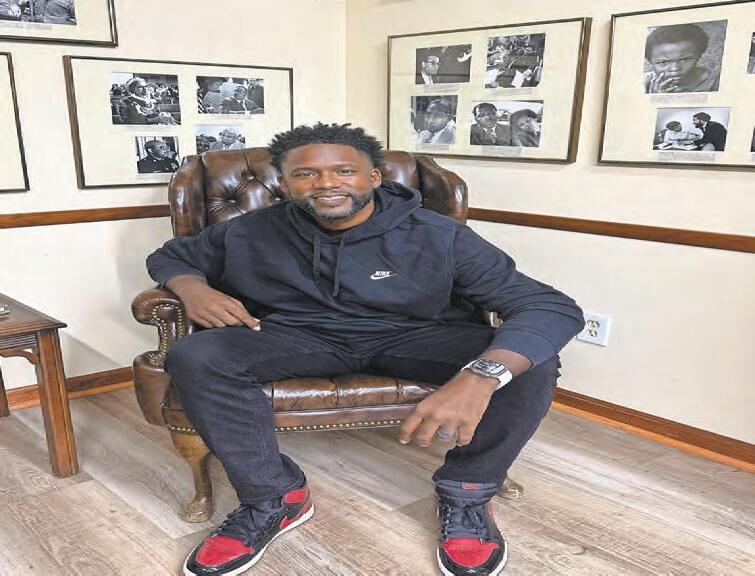
By NOAH WASHINGTON
More than 500 veterans, first responders, and community members climbed 2,071 steps at Mercedes-Benz Stadium on Thursday morning to honor the 2,977 people killed in the Sept. 11, 2001, terrorist attacks.
The second annual 9/11 Memorial Stair Climb, organized by Emory University’s Goizueta Business School, brought participants together to ascend 110 stories through the stadium stands, symbolizing the height of the Twin Towers.
“We will never forget,” said Lorenzo Suarez, managing director of the Master’s in Business for Veterans program at Goizueta Business School and the event’s organizer. “Even though it’s been 24 years, we will never forget, and it’s important to bring everyone together.”
The event drew a diverse crowd that included Atlanta police officers, firefighters, ROTC cadets, and civilians from across the metro area.
Atlanta Police Assistant Chief

Participants encouraged their fellow man throughout the climb, with strangers & loved ones cheering on fellow climbers as they ascended the stadium steps.
“The unity that existed in our country after the tragic events of 9/11 was really very special,” Smith said. “When contrasted with the divisiveness we see today, it’s something to strive for.”
they participated to represent something larger than themselves and support the first responder community.
Jaden Wilbur, a 21-year-old UNG senior, an infantry cadet in army, said the event represents unity in a divided time.
“9/11 symbolizes us as a country coming together,” Wilbur said.
Carven Tyus, who was an investigator assigned to the Special Victims Unit on Sept. 11, 2001, spoke during the opening ceremony at the stadium before the run, citing that he felt compelled to participate in the memorial climb.
“I was at work when every television station went to what was happening with the Twin Towers,” said Tyus, who has served 32 years with the Atlanta Police Department. “It just gave us pause. It changed the way America looked at security.”
The climb honored the 343 firefighters and paramedics and 72 law enforcement officers who died responding to the attacks, as well as all victims of the terrorist strikes in New York, Washington, and Pennsylvania.
Retired Maj. Gen. Matthew D. Smith, executive director of veterans initiatives at Emory University, served as the master of ceremonies during the opening ceremony, noted the unity displayed at the event contrasted with today’s political divisiveness.
Smith, who started working at IBM in Atlanta on Sept. 4, 2001, said the attacks changed the trajectory of his life. He was called to active duty with the Georgia Army National Guard 15 months later for the invasion of Iraq and served almost 25 years on active duty.
Mercedes-Benz Stadium donated the use of its facilities for the event, while BlackRock provided financial support to allow free participation. Other sponsors included Metropolis Parking and OneLife Fitness.
The memorial even brought out those who were not yet born during the attacks, including University of North Georgia (UNG) ROTC cadets who said
Jordan Narhmartey, an 18-yearold UNG freshman studying to be a chaplain in the Army with plans to transfer to the Air Force, said the memorial held personal significance despite his young age.
“I want to represent something bigger than myself,” Narhmartey said. “With the events happening on 9/11, I want to support my country even more.”
For Tyus, the memorial serves a crucial purpose for future generations.
“We have to keep this memory alive for the people coming behind us,” he said. “Some knew that they were never going to come down. So I would be remiss if I didn’t come here and just help keep that memory alive in some way.”
By ISAIAH SINGLETON
Metropolitan Atlanta Rapid Transit Authority (MARTA) Interim General Manager and CEO Jonathan Hunt discussed his vision and nearterm goals during a press conference at MARTA headquarters.
Hunt, previously MARTA’s Chief Legal Counsel, was appointed interim GM/CEO by the MARTA Board of Directors at the August board meeting after the retirement of Collie Greenwood.
During the press conference, Hunt shared his vision for restoring operational safety and reliability, advancing key projects, and preparing for next summer’s World Cup.
Hunt said Atlanta has a good transit system; however, MARTA staff, patrons, and the region aren’t satisfied with “good.”
“This is why we’re going to go from good to great, which will require some short-term discomfort for long-term gain,” Hunt said. “Our vision is to deliver safe, clean, and reliable transit through routine excellence every day.”
The vision, he says, will build consistency and delivery, which will result in building and enhancing the public trust in MARTA. An example of this, he said, is the excellent delivery of service they provided during the Labor Day weekend downtown.
“Atlanta was packed with Dragon Con, College Football goers, as well as folks at the Pride events. We had over 420,000 customers that passed through our system in a three-and-a-half-day period,” he said. “We did so without one violent crime or incident of any kind.”
Additionally, Hunt said his near-term goals for the authority include improving operational
efficiency, improving the safety and security of the transit system, working to advance and deliver key projects, and ensuring MARTA is World Cup-ready for next year.
He said that improving operational reliability is one of the first concrete steps that MARTA will take to achieve each of these goals.
“We recently hired an operational consultant who is embedded with MARTA to go through our systems and look at areas for improvement and efficiency, which will help us enact the same,” he said. “We will continue to recruit, hire, and train some of the region’s best bus and rail operators, as well as mechanics and technicians, officers, and field protective specialists.”
MARTA is also looking for innovative ways to reduce operator absenteeism and reduce several bus cutouts and terminations. Hunt also addressed concerns about MARTA’s safety, saying, “MARTA is one of the safest transit agencies in the country.”
“MARTA Police Department (MPD) has increased patrols and visibility, and hopefully you’ve seen more officers and field protective specialists on our system,” he said. “We’re going to add 10 more field protective specialists and 30 more sworn officers.”
He also says MPD will be fully staffed at approximately 250 officers by the end of Q4 of this year. Violent crime has also been reduced by half in the last five years and down by 16% year over year, from last year to date.
“We know data doesn’t make people feel safe, and if the perception is that the system is unsafe, then we have work to do,” he said.
Another goal Hunt says is to advance and deliver key projects, such as a next-generation bus network redesign, which will deliver 15-minute headways to more than 245% of people who have access to the system.
“We’re going to introduce 12 on-demand zones within a program we’re calling MARTA to reach small zones to allow folks to take more of a micro transit experience,” he said.
Also, they will be implementing their new Automatic Fare Collection System 2.0, which will be an easier, more flexible new evolution of Breeze. The fare gate installation will also begin mid-September in Lindbergh.
According to Hunt, the transition from their old Breeze System to a new, better system will happen at the five-point station in the second quarter, around April 2026. The rehabilitation project work, which includes tiling, lighting, beautification, and more, has also been ongoing and should be completed by spring 2026.
Also, the region’s first bus rapid transit line will be ready and online in Spring 2026. MARTA is also working on an O&M facility in Clayton County, which is coming soon. For the Garnet station, they will also be doing a rehabilitation project that will cause a six-week skip stop beginning in the next few days.
“This work is needed because we’ve got to improve the tile work at that station, some of which are over 40 years old,” he said. “We want to be World Cup ready.”
Speaking of the FIFA World Cup 2026, this is the fourth goal for MARTA: preparation.
“We’re going to be adding additional shuttle
trains in our system to reduce headways at or below the levels we saw on Labor Day, which were at a five-minute interval,” he said.
They will also introduce more load and go teams to help mitigate platform overcrowding. MARTA will enhance its escalator work to ensure no issues and that everyone has the same experience over the six weeks.
Other points MARTA is introducing include:
• Enhanced crowd control measures
• Metering to allow folks to have safe and enjoyable passage between stations, trains, buses, and venues
• MPD will introduce enhanced safety measures, including the addition of the Mobile command unit, drone surveillance units, canine units, and sort units
Hunt also expressed his excitement about the CIM group’s development of Centennial Yards and its multi-billion-dollar project to reshape the Gulch. Additionally, Hunt addressed MARTA’s financial health.
“Many of our peer agencies are facing devastating financial outlooks, deep cuts to service personnel, and capital projects to make ends meet,” he said. “I’m happy to report that MARTA’s financial house is in order and that we’re going to remain budget conscious.”
Furthermore, Hunt says he is not interested in a permanent position as general manager.
“I’m passionate about MARTA and have been here over 12 years, and I want to see MARTA win. When MARTA wins, Atlanta wins. I really enjoy my job and will still be here, but not as your permanent general manager or CEO,” he said.
By ISAIAH SINGLETON
knownwell, the first-of-its-kind weight-inclusive primary care and metabolic health company, officially unveiled the physical expansion of its care offering to the metro Atlanta area.
Located in Sandy Springs, this new location marks the company’s seventh opening in the last year. It brings the company’s physical presence to 10 clinics across the U.S., in addition to virtual care nationwide.
Coming on the heels of knownwell’s most recent opening last month in Woburn, Massachusetts, the new Atlanta location will continue to advance the company’s mission to deliver care, free of bias and shame, for individuals affected by overweight or obesity.
The obesity crisis in America continues to worsen, with one in five U.S. adults experiencing obesity. Few options exist for those seeking a healthcare home.
Offering comprehensive metabolic health services, including the prescription of GLP-1s, nutrition, and behavioral counseling, knownwell’s goal is not solely to help patients lose weight, but to provide a space where their health problems are not dismissed or written off because of their weight.
Having struggled with obesity since childhood, Brooke Boyarksy Pratt, CEO and co-founder of knownwell, says she is extremely passionate
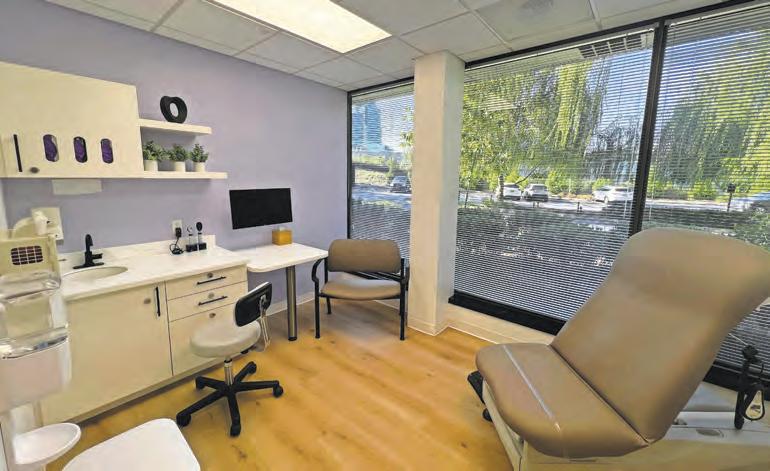
about bringing inclusive care to communities across the U.S.
“Georgia has one of the highest obesity rates in America, yet few options for obesity-focused health services exist, leaving its residents underserved and without access to the comprehensive, compassionate care they deserve,” she said. “knownwell’s arrival in Atlanta is the next step in our nationwide
expansion and continued goal to reach more lives across the U.S.”
The importance of bringing the clinic to Atlanta, Pratt says, is for patients with overweight and obesity conditions who are looking for thoughtful, comprehensive health care.
“We take Medicare, Medicaid, and other commercial insurance. We’re super accessible,” she said.
By NOAH WASHINGTON
Laughter, music, and the tapestry of Latin American voices filled Echo Contemporary Art Gallery Friday evening.
A new exhibition celebrating Latin Heritage Month opened at the gallery, featuring works by 60 Latin American artists from around the world.
The show, titled “OJALA” — a Spanish word meaning “I hope” or “God willing”, running through October, showcases paintings, interactive installations and multimedia works exploring themes of immigration and cultural identity.
Nuestra Creacion founder Patricia Hernandez, who immigrated to Atlanta from El Salvador in 2005, said that Nuestra Creacion emerged from her experiences navigating predominantly white-owned galleries that claimed to support diversity but failed to provide meaningful opportunities.
“I was knocking doors for opportunities and mainly white male owned galleries that they pretend to be community and diversity oriented, but I wasn’t being heard,” Hernandez said during Friday’s opening reception.
Nuestra Creacion launched in 2019 and has now presented seven exhibitions. The current show includes works dedicated to immigrant communities, reflecting what Hernandez described as shared experiences of displacement and systemic oppression.
Featured artists include Dominican

limit people to their immediate circumstances.
Artist Julia Valdes contributed a watercolor painting titled “Mahjong with Lola,” honoring her late grandmother who taught her the traditional tile game. Valdes, a first-generation American, said the piece represents the importance of preserving cultural traditions across generations.
“I lost her in 2021 and I think last summer was a big reflective summer for me to express myself and my artwork and make something that honors her,” Valdes said during the opening reception.
The painting depicts an array of mahjong tiles in watercolor, featuring different characters, directional symbols, and floral designs that represent different suits in the traditional game.
Pratt also said many patients avoid care because of their size as well which another reason they wanted to expand to other markets.
“We’ve made the clinic that’s literally and physically comfortable for patients, regardless of their body size,” she said. “There’s interesting research that suggests that it’s not just about the doctor, but also how they are treated by the front desk or in the billing department
As for services, knownwell offers two primary things, which is inclusive primary care and specific metabolic care. The primary care, she describes, is thoughtful and accepts patients as they are and includes normal primary care such as physicals, preventive screenings, and virtual care.
Metabolic care, she says, offers patients ways to lose weight, manage diabetes, and focusing on managing hypertension.
“With those patients, we help them with those wellness goals,” she said.
Atlanta Market Development Lead Clinician Ijeoma Azonobi says she is thrilled to bring the knownwell model of care to Atlanta, a model that puts the patients at the center, offering compassion, respect, and evidence-based treatment.
“Our community deserves healthcare that makes them feel seen and supported, while addressing the full spectrum of their health needs, not just a number on the scale. I am excited to make that a reality here,” she said.

Republic native Marsy Santos, whose interactive piece “Nina” depicts a young girl looking through metal window bars , structures Santos recognized from both her homeland and certain Atlanta neighborhoods after moving to the city’s West End in 2021.
“This piece is inspired by big dreams of a little girl that she’s looking through a window,” Santos said. The work addresses what she calls the “isolation of communities” and mentalities that
“In order to be able to uphold traditions and culture and things like that, my grandma made it so clear that that was important to pass down,” Valdes said. “It kind of is the idea of keeping something alive that might not be on this earth anymore.”
Valdes described how cultural traditions evolve while maintaining their essence: “You make it your own, and you hold true to the things that are important, but you’re also changing it up in ways that are maybe better for the time that you are living in.”
The exhibition statement emphasizes themes of cultural contribution despite ongoing challenges. “We carry with us seeds
of hope, of flavor, of resilience, and we plant them in every space we touch,” the statement reads.
Hernandez noted that the timing feels particularly relevant given current immigration policies and what she described as systems that “try to uproot us, to silence our presence and erase our contributions.”
“OJALA” runs through October 31. Gallery hours are Tuesday through Sunday, 11 a.m. to 6 p.m.
By DONNELL SUGGS
Iknow we are a couple of weeks late, but we wanted to make sure we found a good and useful way to cover the hundreds of high school football games that take place across metro Atlanta every week during the season. From Fulton to Cobb to DeKalb counties, all the way to the Southside in Clayton and Henry counties, respectively, we want to give our readers five football games to keep an eye on every week.
Introducing the Five High School Football Games of the Week, a quick look at some of the games taking place that interest me, and hopefully interest you.
The games are picked due to the matchups, where they are taking place, rivalries, and players on the field. The state of Georgia has some of the most explosive football talent in the country, and the high school games around metro Atlanta (and in Gainesville, Savannah, and Griffin, for example) are the best way to watch the future of college football.
The Five High School Football Games of the Week will also be part of our weekly sports newsletter, The Final Buzzer, which gathers the weekly sports reporting on The Atlanta Voice website.

Games of the Week: (all games are on Friday night and kickoff at 7:30 p.m.)
1-The undefeated Langston Hughes
Panthers (4-0 overall) at Dutchtown (0-4).
The Bulldogs may be winless, but they play at a very high level at home in Hampton, and
that’s where the Panthers are going to face them on Friday night.
2-The Jonesboro Cardinals (2-2) at Harris County (2-2). The Cardinals are better than their record, and so are the Tigers, especially at Tiger Stadium down in Hamilton. Put on top of that the fact that this is the first road game of the season for the Cardinals, and it’s worth the trip to South Georgia to watch this one.
3-Lithonia Bulldogs (3-0) are hosting the Northview Titans (0-4). The Bulldogs and head coach Kevin Barnes will look to remain undefeated before they play at Druid Hills High School the following week.
4-The undefeated Creekside Seminoles (40) will travel to Atlanta to play the Mays Raiders (1-3). Though it has been a rough start to the season for the Raiders, there are few home crowds who support their team like they do at Mays. The opportunity to beat an undefeated team should bring plenty of fans out.
5-Blessed Trinity (3-1) hosts the Hebron Christian Lions (2-1). The Titans are undefeated at home this season (3-0), and their only loss came to Milton, 21-10, on Sept. 12. The game against the Lions can be seen as a tuneup for the meeting with Savannah Christian in Savannah the following week
By DONNELL SUGGS
The first time professional skater and performer Riona Harris put on a pair of skates, she fell. She was eight years old, and even though the Duluth native had been training in dance since she was two years old, being coordinated on ice wasn’t easy for her.
“I wasn’t good at it, I was falling a lot, but I loved it,” Harris explained. “I was hanging and holding onto the boards because I kept falling.”
Harris said that despite the rough start, there was a certain feeling that she couldn’t shake. The feeling that only ice skating, and maybe surfing and roller skating can duplicate.
“Once I got comfortable, the feeling of gliding felt so incredible,” Harris said.
These days, Harris is very comfortable on ice as a member of the ensemble for Disney on Ice presents Jump In! The show’s East Coast tour is making a stop at Gas South Arena in Duluth. The show is running from September 25-28, and as soon as Harris learned the tour was going to make a stop in metro Atlanta, she knew she was going home. Asked if she could recall the other stops on the tour, Harris needed a moment to remember. She was so excited to return to her hometown, she couldn’t get past those dates.
“I’m very excited to perform in front of my home audience,” she said.
Harris took her first ballet lessons at the age of two and enjoys the art of dance. Disney on Ice always includes plenty of dancing and Harris expects to do a lot of dancing during the show,
which includes 50 Disney characters.
“I was a huge Disney fan growing up,” said Harris, who revealed she would dress up like her favorite characters as a child. “I would play dress up all the time.”
Harris said she is expecting her family, friends, and former coaches to attend some of the shows. In the case of her parents, Yumiko and Lawrence Harris, she joked that they will most likely be at Gas South Arena for all four shows. Her younger brother Kai is in college in the Midwest and might not be able to make a show, but there will be plenty of videos and photos to go around.
“I can’t wait to have my coaches, family, and friends see what I’ve been up to,” she said. “They are a big part of why I’m here and I hope to make my coaches and teachers proud.”
Some of Harris’s favorite professional skaters have been on stages around the world, including the Winter Olympics. Two of her favorites, Meryl Davis and Charlie White, performed together at the 2014 Sochi Winter Olympics.
“I loved it so much I got a skating dress made inspired by Meryl’s dress from that program that year,” she said.
Asked what she believes Disney fans and skating fans will get when they see the show, Harris said she hopes they come away satisfied with the shows she and her fellow castmates put on.
“You will be able to see your favorite Disney stories and Disney princesses during the show,” Harris said. “I think it’s definitely going to be different live.”


Spacious 1-Bedroom Affordable! Rent Based on Annual Income Amenities, Great Location, and Convenient to Marta Please call for detailed information (404) 586-9098


Bid solicitation for 25ITB1492196B-RT Electronic Closed Captioning Transcription Services for the Fulton County Sheriff’s Office, will be accepted online through BidNet Direct on Tuesday, October 07, 2025. All Bids submitted must be received no later than 11:00 a.m. local (Eastern) time on the stated date. https://www.bidnetdirect. com/georgia/fultoncounty
Scope of Work: Fulton County, Georgia (“County”) The selected firm will provide Electronic Closed Captioning Transcription Services for the Fulton County Government. Transcription services for Fulton County Board of Commissioner (BOC) broadcasts are to be provided for no less than twenty-three (23) and no more than thirty (30). 6–8-hour meetings in a twelve-month period.
In order to obtain complete information about this solicitation, please click the link below where this document and supporting documents can be downloaded, https://www.bidnetdirect.com/georgia/fultoncounty
Fee: N/A
Term of Contract: This is an annual agreement with two (2) one (1) year renewal options.
Pre-Bid Conference: will be held virtually online via a Zoom Conference on Thursday, September 18, 2025 at 11:00 A.M. to provide bidders with information regarding this project and to address any questions. Join Zoom Link: https://zoom.us/j/99013962750?pwd=pEKjsoyHDiasmRSBDygjYggxO88E8 A.1&jst=1
If you have any questions regarding this project please contact Roderic Terrell, APA, (404) 612-7965 or Email: roderic.terrell@ fultoncountyga.gov. Fulton County reserves the right to accept or reject any and all applications and to waive technicalities.
You are hereby notified, in accordance with OCGA 40-11-19 (a) (2), that the above-referenced vehicles are subject to a lien and a petition may be filed in court to foreclose a lien for all amounts owed. If the lien is foreclosed, a court shall order the sale of the vehicle to satisfy the debt. The vehicle is currently located at 1314 Brookwood Avenue, Jackson, Georgia 30233. Anyone with an ownership interest in this vehicle should contact the following immediately: Southern Style Towing 1314 Brookwood Avenue Jackson, GA 30233 : 470-344-1634
Vehicle: 2005 Nissan Altima VIN:1N4BL11D55N482472
Vehicle: 2008 Nissan Armada VIN: 5N1BA08D68N627700
Vehicle: 2014 Ford Focus VIN: 1FADP3K23EL222203
Vehicle: 2000 Dodge Ram Van VIN: 2B7JB21Y0YK137254
Vehicle: 1997 Dodge Ram Van VIN: 2B7JB31Z7VK560875
Vehicle: 2003 Ford Explorer Sport VIN: 1FMYU60E33UC04791
Vehicle: 2015 Kia Soul VIN: KNDJN2A26F7147232
Vehicle: 2000 Honda Odyssey VIN: 2HKRL186XYH518886
Vehicle: 2015 Ford Fusion VIN: 3FA6P0D92FR144727
Vehicle: 2003 Pontiac Grand Am VIN: 1G2NW12E13C149463
Vehicle: 2013 Hyundai SONATA VIN: 5NPEB4AC9DH567817
Vehicle: 2019 Nissan Sentra VIN: 3N1AB7APXKY362836
Vehicle: 2006 Chrysler 300 VIN: 2C3KA53G16H383421





SUMMONS BY PUBLICATION, CARE AND PROTECTION, TERMINATION OF PARENTAL RIGHTS, DOCKET NUMBER24CP0219SP, Trial Court of Massachusetts, Juvenile Court Department, COMMONWEALTH OF MASSACHUSETTS, Hampden County Juvenile Court, 80 State Street, Springfield, MA 01103. 413-748-7714. TO: The father of Carly Farrah Eli, born on 09/09/2013 in Atlanta, GA to Peaches Eli: A petition has been presented to this court by Department of Children & Families Springfield, seeking, as to the following child: Carly Farrah Eli, that said child be found in need of care and protection and committed to the Department of Children and Families. The court may dispense the rights of the person(s) named herein to receive notice of or to consent to any legal proceeding affecting the adoption, custody, or guardianship or any other disposition of the child named herein, if it finds that the child is in need of care and protection and that the best interests of the child would be served by said disposition.You are hereby ORDERED to appear in this court, at the court address set forth above, on the following date and time: 10/27/2025 at 09:00 AM Permanency HearingYou may bring an attorney with you. If you have a right to an attorney and if the court determines that you are indigent, the court will appoint an attorney to represent you.If you fail to appear, the court may proceed on that date and any date thereafter to a trial on the merits and adjudication of this matter.For further information call the Office of the Clerk-Magistrate at 413322-6700.WITNESS: Hon. David B. Paradis, FIRST JUSTICE, DATE ISSUED: 09/04/2025, Paul R Viets, Clerk-Magistrate.





















































